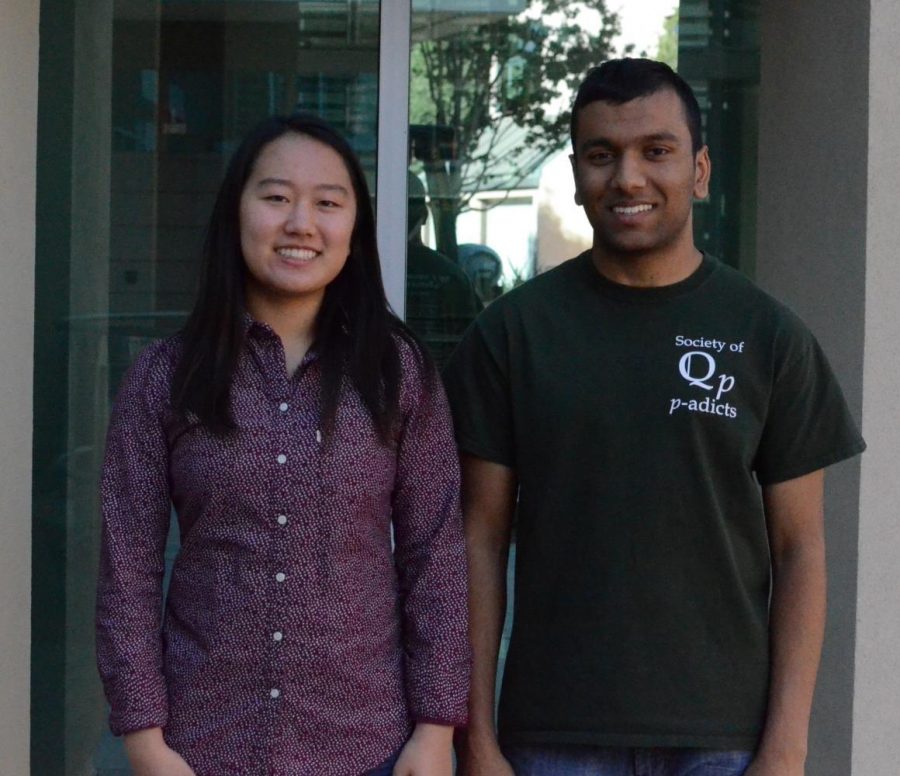Senior Swapnil Garg and junior Katherine Tian named Siemens national finalists
Research partners Swapnil Garg (12) and Katherine Tian (11) received notice on Nov. 6 that the Siemens Foundation named them regional finalists. They developed an automatic cancer-severity classifier at the Heng Lab in Beth Israel Deaconess Medical Center of the Harvard Medical School.
November 13, 2017
The Siemens Foundation named senior Swapnil Garg and junior Katherine Tian as national finalists in this year’s Siemens competition on Monday at 9 a.m.
In each of six regions, up to ten projects were selected as regional finalists, and from there, one individual project and one team project move onto the national competition. At the national level, six team projects and six individual projects vie for a chance to become national winners in the Siemens Competition.
Swapnil commented about feeling surprised when he and Katherine were chosen as national finalists.
“There are so many good projects right, and then after our regional final presentation Q&A, we had no idea what the judges think of us,” he said. “We didn’t see the other projects, so we didn’t know how well we stacked up.”
Swapnil and Katherine worked on a team project to develop an autobiotic classifier that assesses the severity of kidney cancer. The classifier identifies whole slide images of the cells in kidney cancer tumors to help pathologists agree on a patient’s treatment and chances of survival. Since it uses machine learning algorithms, they hope the classifier can evaluate other types of cancers besides only kidney.
The two conducted their research over the summer in the Heng Lab at the Beth Israel Deaconess Medical Center of the Harvard Medical School under Dr. Jan Heng, the Assistant Professor of Pathology at Harvard Medical School. They submitted a research paper to the competition in September before becoming semifinalists and then regional finalists.
After they were named regional finalists, Swapnil and Katherine presented their project via livestream to a panel of judges at the Massachusetts Institute of Technology on Nov. 4.
For the national competition, Swapnil and Katherine will present their project publicly and then attend a private question-and-answer session with the judges at the The George Washington University in Washington, D.C. on Dec. 4-5.
For being chosen as regional finalists, the two received $1,000. Now that they have reached the national level, they will receive at least $25,000 for being finalists. The team that places second will receive $50,000, and the first-place winners will receive $100,000.
Correction: November 14, 2017
A previous version of this article incorrectly named the Heng Lab as the Beck Lab and Dr. Jan Heng as the Instructor of Pathology rather than the Assistant Professor of Pathology. The article has been edited to correct this error.


















![“[Building nerf blasters] became this outlet of creativity for me that hasn't been matched by anything else. The process [of] making a build complete to your desire is such a painstakingly difficult process, but I've had to learn from [the skills needed from] soldering to proper painting. There's so many different options for everything, if you think about it, it exists. The best part is [that] if it doesn't exist, you can build it yourself," Ishaan Parate said.](https://harkeraquila.com/wp-content/uploads/2022/08/DSC_8149-900x604.jpg)




![“When I came into high school, I was ready to be a follower. But DECA was a game changer for me. It helped me overcome my fear of public speaking, and it's played such a major role in who I've become today. To be able to successfully lead a chapter of 150 students, an officer team and be one of the upperclassmen I once really admired is something I'm [really] proud of,” Anvitha Tummala ('21) said.](https://harkeraquila.com/wp-content/uploads/2021/07/Screen-Shot-2021-07-25-at-9.50.05-AM-900x594.png)







![“I think getting up in the morning and having a sense of purpose [is exciting]. I think without a certain amount of drive, life is kind of obsolete and mundane, and I think having that every single day is what makes each day unique and kind of makes life exciting,” Neymika Jain (12) said.](https://harkeraquila.com/wp-content/uploads/2017/06/Screen-Shot-2017-06-03-at-4.54.16-PM.png)








![“My slogan is ‘slow feet, don’t eat, and I’m hungry.’ You need to run fast to get where you are–you aren't going to get those championships if you aren't fast,” Angel Cervantes (12) said. “I want to do well in school on my tests and in track and win championships for my team. I live by that, [and] I can do that anywhere: in the classroom or on the field.”](https://harkeraquila.com/wp-content/uploads/2018/06/DSC5146-900x601.jpg)
![“[Volleyball has] taught me how to fall correctly, and another thing it taught is that you don’t have to be the best at something to be good at it. If you just hit the ball in a smart way, then it still scores points and you’re good at it. You could be a background player and still make a much bigger impact on the team than you would think,” Anya Gert (’20) said.](https://harkeraquila.com/wp-content/uploads/2020/06/AnnaGert_JinTuan_HoHPhotoEdited-600x900.jpeg)

![“I'm not nearly there yet, but [my confidence has] definitely been getting better since I was pretty shy and timid coming into Harker my freshman year. I know that there's a lot of people that are really confident in what they do, and I really admire them. Everyone's so driven and that has really pushed me to kind of try to find my own place in high school and be more confident,” Alyssa Huang (’20) said.](https://harkeraquila.com/wp-content/uploads/2020/06/AlyssaHuang_EmilyChen_HoHPhoto-900x749.jpeg)










